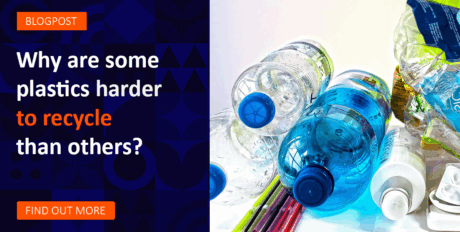Contact us today for your Free Quote
- Species are vanishing up to 1,000 times faster than the natural rate due to human activity.
- In 2022, only around $200 billion was allocated to nature-based solutions, well below 0.5% of the world’s GDP.
- Strategic investments in sustainable material processes, such as recycling, can significantly advance a more circular, eco-friendly economy.
Today is the International Day for Biological Diversity, an awareness day that, as the name suggests, stresses the importance of biological diversity. With recent trends in declining wildlife, it is a pressing matter now more than ever to address this issue and identify positive and negative drivers.
As we reflect on the value of biodiversity, it’s equally important to consider how the role of the global economy aligns with conservation goals. According to the UNEP, in 2022, approximately $200 billion was invested in nature-based solutions (NbS). While this figure has shown growth in recent years, it falls short of the $542 billion needed to meet climate, biodiversity, and land degradation targets by 2030.
In contrast, approximately $7 trillion per year, equivalent to roughly 7% of global GDP, is invested in activities that negatively impact nature. With trends such as these, it becomes increasingly important to identify the positive elements within the world economy that counter this.
As a recycling company, we wanted to write this piece for you to analyse the impact that our sector has on the matter. In this article, we will go through the awareness day’s history, as well as how recycling contributes to preserving the world’s biodiversity.
What is the International Day for Biological Diversity
Some history…
Originally celebrated in late December, the date was shifted in 2000 by the UN General Assembly to honour the adoption of the Convention on Biological Diversity (CBD) on May 22, 1992, during the Earth Summit in Rio de Janeiro. The objective of the day is to increase awareness of our impact on nature.
When is the International Day for Biological Diversity
The International Day for Biological Diversity is observed each year on May 22nd to highlight the importance of protecting the planet’s biodiversity.
International Day for Biological Diversity themes
Moreover, the year is usually accompanied with an annual theme. Here are some key themes from the past few years…
- 2025 – Harmony with nature and sustainable development – This theme underscores the close relationship between humans and the environment, stressing that preserving biodiversity is essential for achieving sustainable development.
- 2024 – Be part of the plan – This theme urges all parties involved to stop and reverse biodiversity loss by actively promoting the adoption of the Kunming-Montreal Global Biodiversity Framework, also known as the Biodiversity Plan. This framework is a key outcome of the 2022 United Nations Biodiversity Conference.
- 2023 – From agreement to action: Build back biodiversity – Similarly to 2024’s theme, it encourages the agreement made at COP15 of the UN Convention on Biological Diversity.
As seen from the listed examples, these themes focus around multi-faceted agreements that account for influences in the wider ecosystem, that is where the recycling sector and the role of sustainable materials come in. In the next section, we will analyse how recycling helps preserve the world’s biodiversity.
How recycling preserves biodiversity
Recycling counters disruptive activities
Recycling counters the extraction of raw materials, which would otherwise typical disrupt local ecosystems. The global economy’s reliance on extracting finite natural resources further strains ecosystems, often causing irreversible damage. For example, according to Earth.org, deforestation driven by agriculture and logging results in the loss of approximately 10 million hectares of forest each year, threatening biodiversity and accelerating climate change. Mining activities, essential for materials like metals and minerals, frequently lead to soil degradation, water pollution, and habitat destruction. According to UK Parliament, global mining produced over 3.3 billion tonnes of materials in 2021 alone, highlighting the scale of environmental pressure. These extraction practices underline the urgent need to shift toward sustainable material use and reduce reliance on virgin resources.
To put it into perspective, recycling aluminium uses 95% less energy than producing it from raw materials, dramatically reducing environmental impact. Similarly, recycling steel saves about 74% of the energy required for primary production, while recycled paper cuts energy and water use by 40% and 60%. By diverting materials from extraction and manufacturing, recycling not only conserves finite resources but also reduces greenhouse gas emissions and pollution associated with mining and deforestation.
Recycling manages our waste
Recycling mitigates the production and release of otherwise disruptive materials into the ecosystem. Excess waste, particularly from single-use plastics, poses a significant threat to ecosystems and wildlife worldwide. According to the United Nations Global Compact, an estimated 8 million tonnes of plastic waste enter the oceans annually, harming marine life through ingestion and entanglement. Studies show that over 700 species are affected by plastic pollution, including endangered animals like sea turtles and seabirds. The persistence of plastics, which can take hundreds of years to decompose, makes addressing this waste crisis urgent.
The pervasive issue of single-use plastic waste underscores the urgent need for effective recycling solutions. Recycling plastics significantly reduces the volume of waste entering ecosystems, preventing harm to wildlife and habitats. For instance, recycling just one tonne of plastic can save up to 5,774 kilowatt-hours of energy and prevent nearly a tonne of CO2 emissions. By keeping plastics out of oceans and landfills, recycling helps protect the aforementioned species.
Conclusion
On this International Day for Biological Diversity, it’s clear that the recycling sector plays a vital role in protecting our planet’s ecosystems. By reducing the need for raw material extraction and keeping harmful waste out of nature, recycling directly contributes to preserving biodiversity. While global investment in nature still falls short, the everyday act of recycling is a powerful tool for change. As we push toward a more sustainable, circular economy, every recycled item brings us one step closer to a healthier, more biodiverse world.
You made it this far…
Bywaters is proud to be a leading recycling company serving Greater London, with sustainability at the heart of everything we do. This International Day for Biological Diversity, why not take a step toward a greener future by improving your waste management practices with us? Whether you’re looking to enhance your recycling systems or get involved in hands-on sustainability initiatives, our dedicated Sustainability team runs a wide range of volunteering activities for businesses, communities, and individuals. Ready to make a lasting impact? Contact us today to learn more.
More posts:
Valentine’s Day: History, Tradition, and Its Modern Impact
This post traces the evolution of Valentine’s Day from ancient Roman rituals to a global commercial event. It highlights the holiday’s hidden environmental impact and offers a guide to celebrating sustainably through “Circular Romance” and waste reduction.
Read morePlastic Recycling: Why Are Some Types Harder to Process Than Others?
Some plastics recycle easily, while others are difficult or impractical to process at scale. This article explains why material type, packaging design, contamination and recycling infrastructure all play a role, and what businesses can do to improve plastic recycling outcomes in the UK.
Read moreThe Ultimate Guide For a Sustainable School and University
Download The Ultimate Guide For a Sustainable School or University. Get the roadmap to cut costs, reduce your carbon footprint, and boost your ESG profile with 5 core pillars.
Read more




